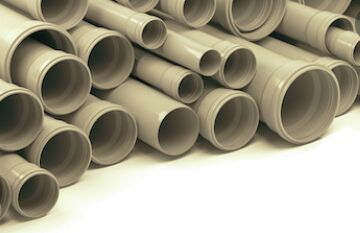Thermoplastic Pipes - A Critical Solution to South Africa’s Water Crisis
Written by: Monique Holtzhausen Save to Instapaper
Gauteng’s water crisis, which dominated headlines in November and December 2024, has exposed the province's worsening water insecurity. Widespread and frequent outages have left communities without water for days or even weeks. Aging infrastructure, illegal water connections, and insufficient interventions have compounded the crisis, described by Water and Sanitation Minister Pemmy Majodina as a “self-inflicted crisis.”
The Scale of Water Loss
Deputy Minister of Water and Sanitation David Mahlobo revealed that out of the five billion litres of treated water distributed daily by Rand Water, an astonishing 2.3 billion litres—nearly half—is lost due to leaks and unmaintained municipal infrastructure. This results in a nonrevenue water rate of 49.2%, underscoring the urgent need for repair and modernisation of infrastructure.
Thermoplastic Pipes: A Vital Solution
Thermoplastic pipes, manufactured by members of the Southern African Plastic Pipe Manufacturers Association (SAPPMA), provide a critical solution for reducing water losses and improving infrastructure reliability.
Key Benefits of Thermoplastic Pipes
-
Reduced Water LossPlastic pipes are significantly less prone to leaks compared to traditional materials, ensuring efficient water delivery.
-
Durability and LongevityWith a lifespan of up to 100 years, thermoplastic pipes require less frequent replacement and maintenance.
-
Environmental AdvantagesLightweight and energy-efficient to produce, they have a lower carbon footprint than metal or concrete alternatives.
-
Cost-Effective InstallationFlexible and lightweight, thermoplastic pipes are easier to transport and install, reducing overall project costs.
-
Enhanced Flow EfficiencySmooth interior surfaces minimise friction losses, improving the efficiency of water distribution systems.
SAPPMA: Ensuring Quality and Reliability
SAPPMA plays a pivotal role in promoting high-quality, certified plastic pipes. Pipes bearing the SAPPMA mark meet stringent manufacturing standards, ensuring reliability and longevity.
Jan Venter, CEO of SAPPMA, emphasises:"The importance of specifying quality thermoplastic pipes cannot be overstated. Decision-makers and specifiers must include the SAPPMA mark in their tender specifications to ensure the installation of pipes that meet local and international standards."
Addressing South Africa’s Water Scarcity
As a water-scarce nation, South Africa cannot afford to lose billions of litres of treated water daily. The adoption of thermoplastic pipes must be prioritised by municipalities, engineers, and developers to tackle challenges like leaks, infrastructure failures, and illegal connections.
Call to Action
To make Gauteng water-secure, urgent steps are needed to fix municipal reticulation systems, eliminate leaks, and tackle illegal water connections. Thermoplastic pipes offer a proven solution for sustainable water management, ensuring a secure future for generations to come.
Press Release Submitted By
Company Name: Southern African Plastic Pipe Manufacturers Association (SAPPMA)Contact Person: Jan VenterWebsite: www.sappma.co.za
Social Media Post
Thermoplastic Pipes: Solving South Africa’s Water CrisisThermoplastic pipes offer a durable and efficient solution to address South Africa’s water losses and infrastructure challenges.
#SAPPMA #ThermoplasticPipes #WaterCrisis #InfrastructureSolutions #mypressportal #pressrelease #AfricaNewsroom #bizcommunity #publicrelations #africa #southernafrica #southafrica
Get new press articles by email
227 Press Release Articles
PR Consultancy focussing on the plastics and recycling industries
Latest from
- Three Interns Embark on an Exciting Career Journey at Plastics SA Through Government’s YES Programme
- THREE INTERNS EMBARK ON AN EXCITING CAREER JOURNEY AT PLASTICS SA THROUGH GOVERNMENT’S YES PROGRAMME
- SAPPMA Marks Milestone at 20th Annual General Meeting with Renewed Commitment to Quality
- Plastics SA Hosts Global First - Self-Employed Material Recycler Training Programme Empowers South Africa’s Waste Pickers
- World Plastics Council and Global Plastics Alliance Urge South African Government to Secure Treaty to End Plastics Pollution
- Plastics Industry Urges Reevaluation of South Africa’s On-Pack Recycling Labels (OPRLs)
- Plastics SA Appoints Lazola Pendu as Sustainability Project Coordinator
- Outcome of SAPPMA Special Meeting - Renewed Focus on Quality
- The Future of Public-Private Partnerships (PPPs) in South Africa's Government's New Utility (GNU) Strategy
- Plastics SA Releases 2023 Polymer Consumption and Recycling Figures
- Trash4Treats and MetPac-SA Expand Inter-Schools Environmental Sustainability Project to Gauteng & KZN
- Record-Breaking Success at the 2024 Clean-Up & Recycle SA Week
- Clean-Up & Recycle SA Week 2024 - Join The Movement To Make A Difference
- NHI Bill Highlights The Crucial Role Of Proper Maintenance In Healthcare Facilities
- "Anticipating The Unseen" The Importance Of Detailed Real Estate Due Diligence
The Pulse Latest Articles
- Education Is The Frontline Of Inequality, Business Must Show Up (December 11, 2025)
- When The Purple Profile Pictures Fade, The Real Work Begins (December 11, 2025)
- Dear Santa, Please Skip The Socks This Year (December 10, 2025)
- Brandtech+ Has 100 Global Creative Roles For South African Talent (December 9, 2025)
- The Woman Behind Bertie: Michelle’s Journey To Cape Town’s Beloved Mobile Café (December 9, 2025)
